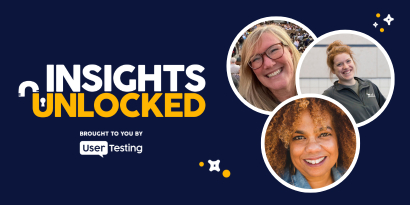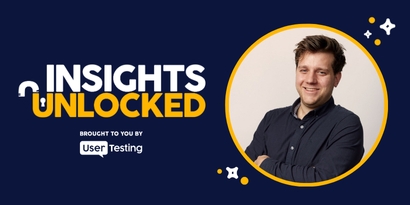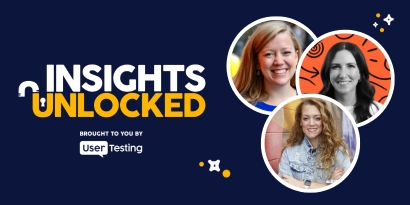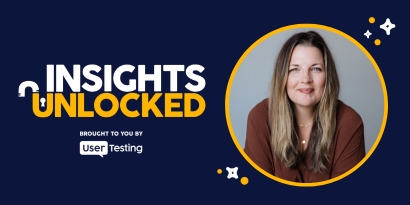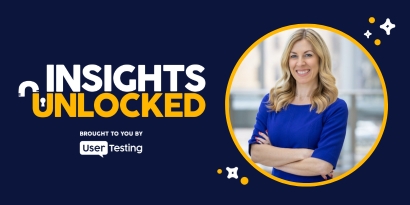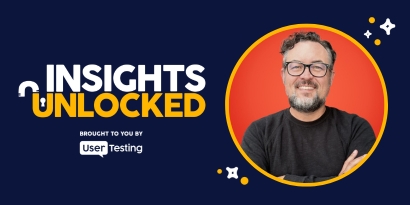
Episode 133 | September 02, 2024
Unlocking collaboration: Kasey Canlas on leveraging internal expertise in UX research
In this episode, Kasey Canlas from Genesys emphasizes the importance of working with your internal teams to improve your UX research
How Building Relationships Can Transform Your UX Research: Insights from Kasey Canlas
According to Kasey Canlas, UX Research Manager at Genesys, the secret to making your research truly impactful lies in building strong, proactive relationships across your organization.
“It’s about learning how to collaborate with others,” Kasey shared in this week’s Insights Unlocked. During the conversation, she emphasized that UX researchers shouldn’t work in isolation but rather seek out opportunities to tap into the unique skills of those around them.
Kasey explained that by looking beyond the UX team, researchers can discover valuable insights and techniques that can enhance their own work. “Look around the company and see if there are opportunities where you can use other people's specialties to improve what you're doing,” she advised. This approach not only improves the quality of the research but also helps in building stronger relationships within the organization.
Practical tips for building genuine connections
So how can you start building these crucial relationships? Kasey suggests taking simple, consistent steps: “It doesn’t have to be right away. You don’t have to schedule 50 interviews in one week and then go talk to everybody. It can be 15 minutes just saying, ‘Hi, how are you doing? How’s life?’ without immediately asking them about work.”
This approach not only helps in forming genuine connections but also sets the stage for future collaborations. “Having those introductions can help you get ahead before you need something. That’s a real work relationship, not just asking for something when you need it.”
"Having those introductions can help you get ahead before you need something." — Kasey Canlas, UX Research Manager at Genesys
Kasey’s experience at Genesys illustrates how this strategy pays off in the long run. Early in her tenure, she made it a point to meet key players in the company—even those in departments she didn’t immediately need to interact with. This proactive networking provided her with valuable insights into how different teams operate and what they prioritize, making her future interactions far more effective.
Understanding what stakeholders value
Kasey also pointed out that effective collaboration requires ongoing communication with all relevant teams, not just product management or engineering. “It’s important to not just think about product managers or developers, but to look at all of your different stakeholders,” she said.
“It’s not a bad idea to set up one-on-ones,” she said. “Instead of just in a group setting, take some time to ask, ‘Hey, do you have any questions about this?’ Maybe they’re not comfortable asking in a group setting because we’re all proud of what we do, and sometimes we don’t want to admit what we don’t know.

“That’s where research is really great. It’s about giving that information, informing it, and making sure we’re working in the right direction, not just trying to get work done,” she said. “Because when you try to get work done and it’s not the right work, you basically just wasted all your time and effort.”
Making your findings clear and actionable
During the interview, Kasey highlighted the importance of making research findings clear and actionable for stakeholders. “You don’t want to put a lot of fluff into your deliverables or presentations because you’ll lose your audience,” she noted. By presenting concise, easily digestible information, researchers can ensure their work has a lasting impact.
Her advice underscores the value of cross-departmental collaboration in achieving meaningful UX outcomes. As Kasey put it, “It’s about making sure everything you have—whether it’s findings or recommendations—is actionable, clear, and easy to follow.”
“If you leave any ambiguity, you're basically asking them to interpret something, and that's not going to go the way you want it to,” she said.
Episode Links:
- Kasey Canlas on LinkedIn
- UXDX conference
- BLOG: How to Get Stakeholder Buy-In for User Research: Expert Tips
- BLOG: Investing in UX Research: 6 Tips to Convince Stakeholders
- BLOG: How to Create a UX Research Plan
- BLOG: A Quick Guide to Collaborative Usability Testing
- BLOG: How to Write a UX Research Report and Present Your Findings

